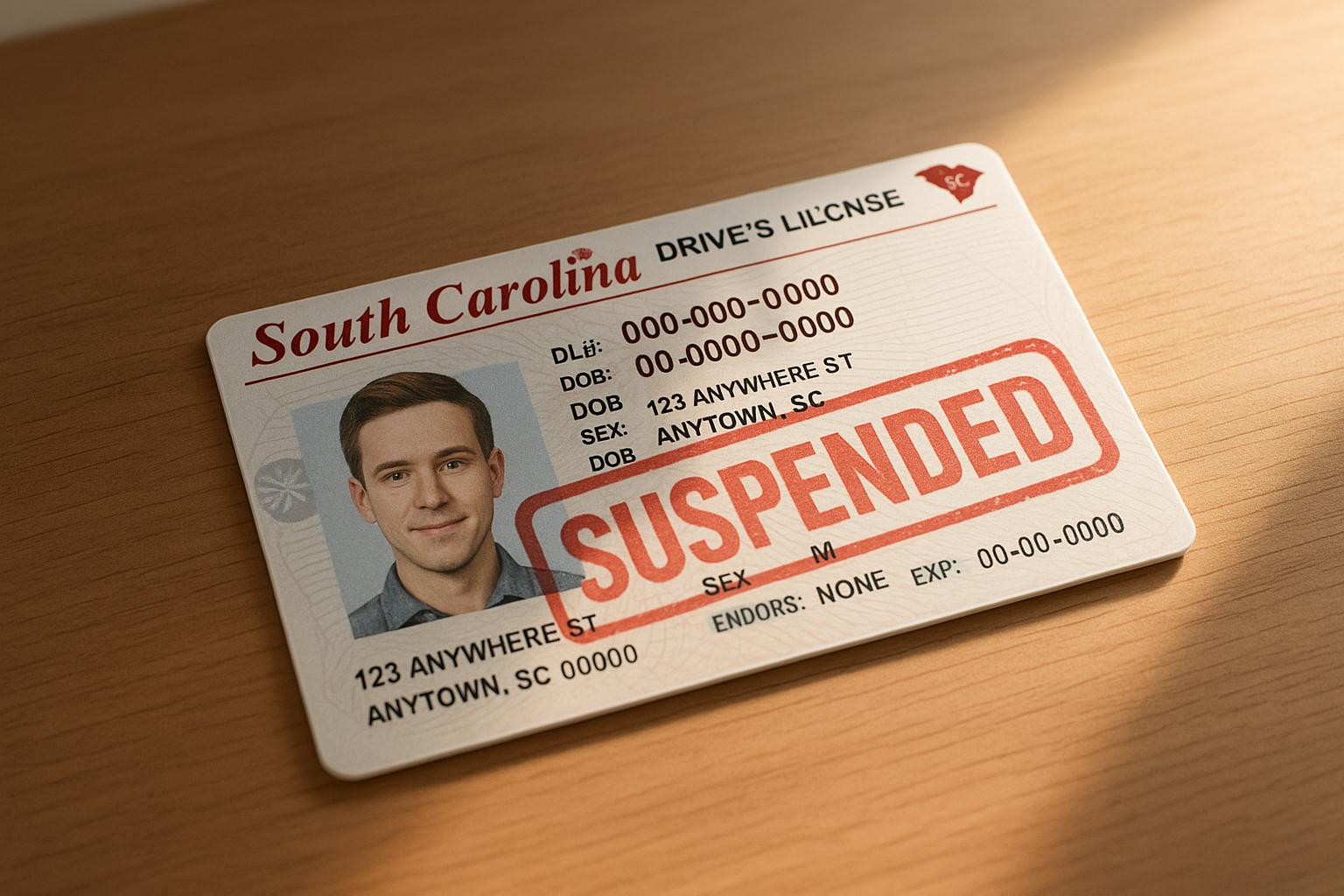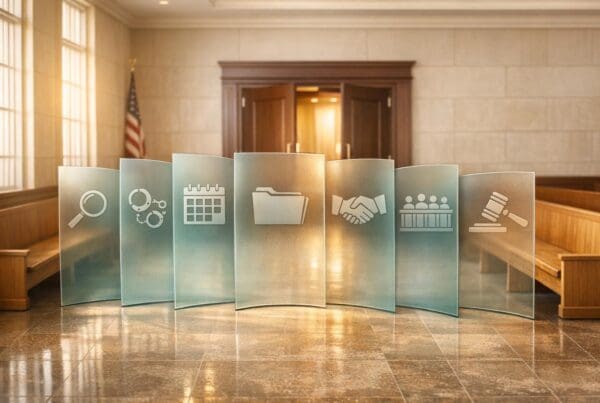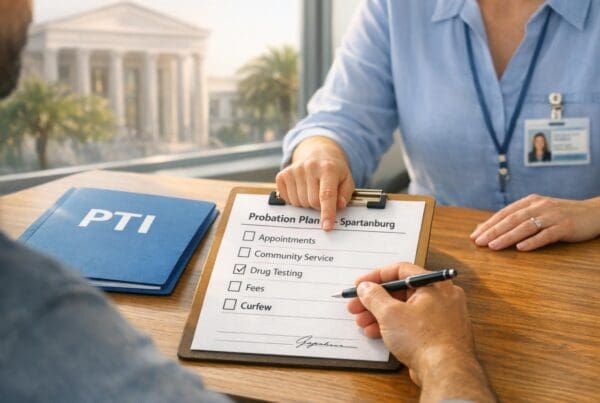Facing a DUI charge in South Carolina can lead to immediate and severe consequences for your driver’s license. Here’s what you need to know:
- License Suspension: A DUI arrest often results in your license being confiscated on the spot, with suspension periods ranging from 6 months for a first offense to lifetime revocation for a fourth offense.
- Implied Consent Law: Refusing a breathalyzer leads to automatic penalties, including a 6-month suspension for the first refusal.
- Ignition Interlock Devices (IIDs): As of May 2024, all DUI offenders must install an IID to regain driving privileges.
- Reinstatement Process: To get your license back, you must complete Alcohol and Drug Safety Action Program (ADSAP), pay fees, and possibly meet IID requirements.
- Administrative Hearings: You have 30 days to contest a suspension, but missing this deadline means losing the chance to appeal.
Act quickly to protect your driving privileges. The process is complex, and legal representation can help navigate administrative and criminal proceedings.
License Suspension and Penalties After a DUI
Facing a DUI charge in South Carolina comes with both administrative and criminal penalties, and these can significantly impact your driving privileges. Knowing the suspension periods and potential consequences can help you navigate what lies ahead.
How Long Your License Gets Suspended
The length of your license suspension depends on your prior offenses and the details surrounding your arrest. South Carolina uses a progressive penalty system, meaning the penalties become harsher with each subsequent violation.
- First-time offenders: A six-month license suspension.
- Second DUI convictions: A one-year license suspension. South Carolina considers any DUI conviction within the past 10 years when determining your offense level.
- Third DUI offenses: A two-year suspension. If the third offense happens within five years of the first, the suspension increases to four years.
- Fourth or subsequent DUI convictions: These lead to permanent revocation of your driver’s license.
- Felony DUI charges: A suspension period of three years plus any time served in prison.
| DUI Offense | License Suspension Period |
|---|---|
| First offense | 6 months |
| Second offense | 1 year |
| Third offense | 2 years (4 years if within 5 years of first) |
| Fourth offense | Permanent revocation |
| Felony DUI | 3 years plus time served |
It’s also worth noting that administrative and criminal suspensions can overlap. This means you might face two separate suspension periods at the same time.
Next, let’s discuss the penalties for refusing a chemical test during a DUI stop.
Penalties for Refusing Chemical Tests
South Carolina enforces an implied consent law, meaning that by driving, you agree to take a chemical test if stopped for suspected DUI. Refusing to take the test comes with automatic penalties, even if you’re not convicted of DUI.
- First-time refusal: A six-month license suspension. This suspension applies regardless of whether you’re ultimately convicted of DUI.
- Second refusal: A nine-month suspension if it occurs within the lookback period.
- Third or subsequent refusals: Depending on the circumstances, the suspension can range from 12 months to two years.
Refusing a breathalyzer can also be used against you in court. Prosecutors may argue that the refusal indicates you were likely over the legal limit.
Additionally, refusal comes with extra hurdles for reinstating your license. These may include obtaining a temporary alcohol license, installing an ignition interlock device, or completing alcohol education programs. Refusal can also lead to increased auto insurance premiums and the requirement to carry SR-22 insurance.
How to Get Your License Back After a DUI in South Carolina
If you’ve lost your driving privileges due to a DUI in South Carolina, there are specific steps you must follow to get your license back. These steps depend on your offense history and the date of the violation, and the South Carolina DMV must approve your reinstatement request. A key part of the process now involves understanding the state’s updated ignition interlock requirements.
Ignition Interlock Device Rules
In 2024, South Carolina expanded its ignition interlock program, becoming the 35th state to adopt an All-Offender Ignition Interlock Device (IID) policy. Starting May 19, 2024, anyone with a DUI/DUAC or Felony DUI suspension for offenses on or after this date must install an IID to regain driving privileges. An IID is a breathalyzer installed in your vehicle that prevents it from starting if alcohol is detected in your system.
Under Emma’s Law, stricter rules apply to certain first-time offenders. For example, drivers with a Blood Alcohol Content (BAC) of 0.15 or higher must complete the IID program and use a camera-equipped device. For offenses dated October 1, 2014, or later, there’s no way to reinstate your license without successfully finishing the IID program, which is managed by the Department of Probation, Parole and Pardon Services.
Here’s a breakdown of IID requirements based on offense level and BAC:
| Offense Level | BAC Level | IID Installation Period |
|---|---|---|
| First Offense | Over 0.08% | 6 months |
| Second Offense | Any | 2 years |
| Third Offense | Any | 3 years (4 years if within 5 years of first offense) |
| Fourth or Subsequent | Any | Lifetime |
The IID must be inspected, and its data downloaded every 60 days at an approved service center. Tampering with the device or having someone else blow into it can lead to additional penalties.
"States have seen a 16% reduction on average in drunk driving deaths when they have a law this strong." – Steven Burritt, MADD’s regional executive for South Carolina
To confirm your specific IID requirements, contact the South Carolina Department of Motor Vehicles directly. Once your IID obligations are clear, you can move on to the next steps for reinstating your license.
License Reinstatement Process
After addressing the suspension details and completing any administrative hearings, you’ll need to follow these steps to regain your driving privileges:
- Complete the Alcohol and Drug Safety Action Program (ADSAP): This is mandatory for all DUI cases.
- Pay reinstatement fees: A $100 fee applies per suspension. Payments can be made online, at any DMV branch, or by mail.
- Settle court-ordered fines: All fines must be paid before your license is restored.
- Obtain SR-22 insurance certification: This may be required by your insurance provider, especially for repeat offenders.
If your reinstatement fees exceed $200, the DMV offers payment plans to help manage costs. For payments by mail, include your customer or driver’s license number and send a check or money order to:
SCDMV, Driver Records
PO Box 1498
Blythewood, SC 29016-0028.
During your suspension, you might qualify for limited driving privileges, such as a route-restricted license. This $100 license allows driving to work, school, ADSAP, or court-ordered programs. However, non-U.S. citizens are only eligible if they hold permanent resident status.
For certain recent violations, you could also apply for a Temporary Alcohol License (TAL) for $100 while waiting for an administrative hearing. This option is available for suspensions with violation dates of May 19, 2024, or later.
Administrative Hearings: Fighting Your License Suspension
If you’re arrested for DUI in South Carolina, your license is automatically suspended. But here’s the good news: you have the right to fight this suspension through an administrative hearing. This process is entirely separate from your criminal DUI case and focuses on whether the arresting officer followed South Carolina’s implied consent laws. It’s important to note that even if your DUI charges are later dropped or dismissed, your license suspension stays in place unless you win this hearing.
How to Request a Hearing
To challenge your suspension, you must request a hearing within 30 days of your arrest. This involves submitting the Notice of Suspension along with a $200 fee. The deadline is strict – miss it, and you lose the chance to contest the suspension. Keep in mind, the 30-day clock starts ticking from the date of your arrest, not when you receive court documents or other paperwork.
"My office prioritizes swift action when retained for DUI defense. Typically, we file the petition to challenge the suspension – which also serves as the request for the administrative hearing – the same or next business day. This allows our clients to begin legally driving again as quickly as possible, usually within about two business days." – Attorney James R. Snell, Jr.
Filing quickly also makes you eligible for a $100 Temporary Alcohol License (TAL). This license lets you drive legally while waiting for your hearing, which is usually scheduled within 2 to 6 months after your request.
The hearing itself is conducted by the Office of Motor Vehicle Hearings, part of the South Carolina Administrative Law Court, and follows civil procedures. Once your hearing is scheduled, it’s important to understand the possible outcomes and how they might affect your driving privileges.
What Can Happen at Your Hearing
After your hearing, the result will typically fall into one of three outcomes: license reinstatement, upholding the suspension, or eligibility for restricted driving privileges.
- If you win the hearing, your suspension is lifted immediately. This means you can resume driving, as long as there are no other restrictions or suspensions on your record. Success often hinges on proving that the arresting officer didn’t follow proper procedures under implied consent laws or lacked reasonable grounds for the arrest.
- If the officer doesn’t show up, you win automatically. Believe it or not, this happens more often than you’d think – officers sometimes miss hearings due to scheduling conflicts or other obligations.
- If you lose the hearing, the suspension stays in effect. In this case, you may need to complete the Alcohol and Drug Safety Action Program (ADSAP) and possibly install an ignition interlock device, depending on your situation. The length of your suspension depends on factors like your BAC level or whether you refused chemical testing.
Statistics show that about 70% of drivers arrested for DUI in South Carolina either refuse chemical testing or blow a BAC of 0.15 or higher, which makes the administrative hearing process a critical step for most DUI cases. First-time offenders could face up to a year-long license suspension.
Having a skilled attorney on your side can make a big difference. They can pinpoint weaknesses in the case against you, review evidence like police reports and breathalyzer results, and build a solid defense. They’ll also guide you on whether to testify and help you prepare if you decide to take the stand. Legal representation isn’t just helpful – it could be the key to getting back on the road.
sbb-itb-ce0cbb0
SR-22 Insurance and DUI Costs
Getting a DUI in South Carolina has far-reaching consequences. Beyond the immediate legal penalties, it leads to hefty fines, long-term insurance rate hikes, and the added expense of filing an SR-22 certificate.
What is SR-22 Insurance?
SR-22 isn’t a separate insurance policy – it’s a certificate that proves you meet South Carolina’s minimum auto insurance requirements. If you’re convicted of a DUI or DUAC (driving with unlawful alcohol concentration), securing an SR-22 is mandatory to reinstate your license and register your vehicle. This requirement typically lasts three years, and any lapse in coverage during this time can result in another suspension of your driving privileges.
Not all insurance companies handle SR-22 filings. If your current provider doesn’t, you’ll need to find one that does. While the filing fee itself is relatively small – usually between $15 and $25 per year – the real hit comes from higher insurance premiums. SR-22 insurance can cost roughly double what you’d normally pay for auto coverage. For example, drivers in South Carolina with an SR-22 pay an average of $1,311 annually for minimum coverage. Over the three-year period, these increased premiums can add up to nearly $10,000.
If you don’t own a car, you’ll still need to maintain coverage by purchasing a non-owner SR-22 policy. And if you move out of state during your SR-22 period, you’ll need to work with your insurer to handle any out-of-state filing requirements.
Now, let’s break down the costs associated with DUI fines and insurance rate increases.
DUI Fines and Insurance Cost Breakdown
A DUI conviction hits hard financially. For a first offense, you’re looking at:
- Jail time ranging from 48 hours to 30 days
- A $400 fine
- A license suspension lasting around six months
- An annual insurance rate increase of about $567
The penalties get stiffer with repeat offenses.
On average, monthly insurance premiums jump from $215 for drivers with a clean record to about $269 after a DUI – a difference of roughly $54 per month. Overall, South Carolina drivers see an average 40% increase in insurance rates following a DUI, which is lower than the national average of 65%.
A DUI stays on your driving record for up to 10 years in South Carolina, keeping your insurance rates elevated during that time. To help reduce these costs, it’s smart to shop around and compare quotes from different insurers. For instance, the cheapest liability-only policy for drivers with a DUI averages about $80 per month.
These financial burdens, combined with the legal and administrative challenges, make DUIs a costly mistake in more ways than one.
Conclusion: Dealing with DUI License Issues in South Carolina
Facing a DUI charge in South Carolina comes with a maze of legal and administrative hurdles that directly impact your ability to drive and your financial well-being. With stricter DUI laws taking effect in May 2024, understanding your rights and acting quickly is more important than ever.
The new regulations raise the stakes significantly. Ignition interlock devices (IIDs) are now required for all DUI offenders. Repeat offenses lead to longer IID restrictions, and a fourth or subsequent DUI conviction results in mandatory lifetime IID use.
Time is of the essence when dealing with these charges. You have a narrow window to request an administrative hearing, contest any suspension, and work toward meeting reinstatement requirements. Taking action promptly could mean maintaining some driving privileges instead of losing them entirely.
Beyond the legal consequences, the financial burden can be overwhelming. Costs can climb into the tens of thousands of dollars, and failing to meet any requirements can result in additional penalties or extended suspensions.
Seeking guidance from an experienced attorney can make a world of difference. A qualified lawyer can help you navigate administrative hearings, explain your options, and advocate for your case throughout the process. Remember, being charged with a DUI doesn’t equate to guilt, and strong legal representation can significantly influence the outcome.
FAQs
What should I do right away to protect my license after a DUI charge in South Carolina?
If you’re facing a DUI charge in South Carolina, acting promptly is crucial to safeguard your driving privileges. The first step is to request an administrative hearing within 30 days to contest any potential license suspension. Missing this window means your license could be automatically suspended.
It’s also important to connect with an experienced DUI attorney who can walk you through the legal process and explain your options. They can assist with steps like applying for a temporary license or addressing ignition interlock requirements. Acting quickly helps you stay on top of deadlines and take the right steps to protect your ability to drive.
What is an Ignition Interlock Device (IID), and how does it work for DUI offenses in South Carolina?
What Is an Ignition Interlock Device (IID)?
An Ignition Interlock Device (IID) is a breathalyzer installed in your vehicle to stop it from starting if it detects alcohol on your breath. In South Carolina, only authorized service providers can install these devices. As the driver, you’re responsible for covering the costs of installation, maintenance, and monitoring. On top of that, the device needs regular inspections and data downloads, usually every 60 days.
How long you’ll need an IID depends on your DUI offense. For a first offense, you’re looking at six months. A second offense bumps that up to two years, and a third offense means three years with the device. Staying on top of IID requirements is essential if you want to keep your driving privileges and avoid more penalties.
What are the financial costs of a DUI in South Carolina, and how can I handle them effectively?
A DUI conviction in South Carolina can hit your wallet hard, with fines ranging from $400 to $10,000, depending on the offense’s severity. But fines are just the beginning. You’ll also need to account for court fees, surcharges, and mandatory program costs, which can tack on hundreds or even thousands more.
Then there’s the long-term financial blow: your car insurance. A DUI can cause your premiums to skyrocket, and you could be stuck with those higher rates for up to seven years. On top of that, you might need to file an SR-22 insurance certificate, which comes with its own extra costs.
To stay ahead of these expenses, it’s worth taking a strategic approach. Start by setting up a budget to handle fines and fees. Check if the court offers payment plans to ease the burden. And don’t underestimate the value of consulting a seasoned attorney – they might be able to help reduce penalties or negotiate costs. Tackling the financial side head-on can make a challenging situation a little more manageable.





